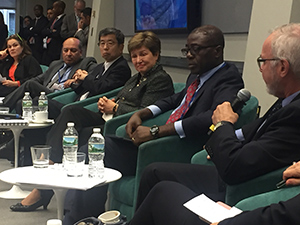
Global challenges like development and migration can only be tackled efficiently when Multilateral Development Banks (MDB) work together even more closely, EIB President Werner Hoyer stressed at the World Bank/IMF Annual Meetings in Washington on Friday. “We are strong believers at the EIB in multilateralism and co-operative structures”, the President of the European Investment Bank said in a panel discussion with heads of other leading MDBs at the World Bank headquarters. “The EIB is open to close collaboration with other MDBs.”
“We have to rely on this MDB family of ours”, agreed Kristalina Georgieva, Chief Executive Officer of the World Bank. “We have a mission to ensure that multilateralism is alive and kicking”.
Less grants, more loans
The panel discussed the challenges in development. “We can’t reach the Sustainable Development Goals without mobilising the private sector and speaking its language”, Hoyer said. “We need to spend less on grants and subsidies and more on loans and guarantees in order to be able to share the risk”, he demanded and spoke of a paradigm shift in development policy. To achieve this, the EIB needed to draw conclusions from its experience with the Juncker Plan.
“We must be ready to learn from each other’s operations in regions where we may have less experience”, Hoyer added. MDBs increasingly work together to measure the impact of their activities and to exchange best practices. A successful example for this is the Global Emerging Markets Risk database (GEMs).
Founded by the EIB and the World Bank Group’s International Finance Corporation in 2009, it collects data from MDBs and other international financial institutions on defaults, losses and recoveries to improve the appraisal of investment opportunities and risk management, especially in emerging markets.